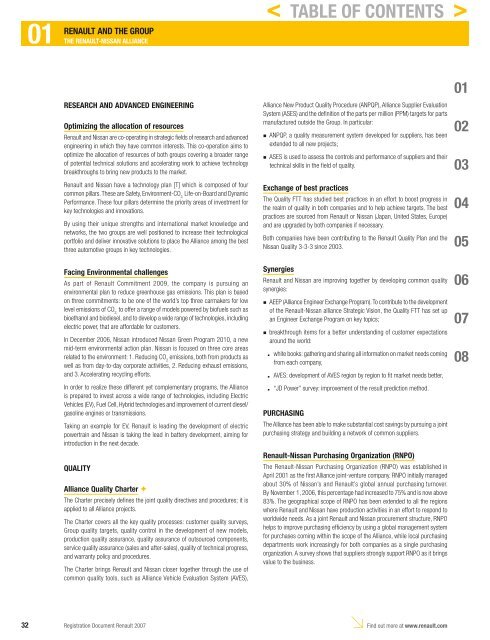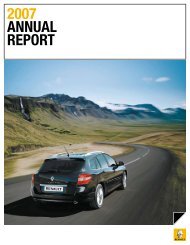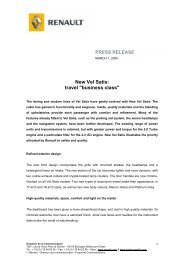2007 Interactive Registration Document - Renault
2007 Interactive Registration Document - Renault
2007 Interactive Registration Document - Renault
You also want an ePaper? Increase the reach of your titles
YUMPU automatically turns print PDFs into web optimized ePapers that Google loves.
01 THE<br />
RENAULT AND THE GROUP<br />
RENAULT-NISSAN ALLIANCE<br />
RESEARCH AND ADVANCED ENGINEERING<br />
Optimizing the allocation of resources<br />
<strong>Renault</strong> and Nissan are co-operating in strategic fi elds of research and advanced<br />
engineering in which they have common interests. This co-operation aims to<br />
optimize the allocation of resources of both groups covering a broader range<br />
of potential technical solutions and accelerating work to achieve technology<br />
breakthroughs to bring new products to the market.<br />
<strong>Renault</strong> and Nissan have a technology plan [T] which is composed of four<br />
common pillars. These are Safety, Environment-CO 2, Life-on-Board and Dynamic<br />
Performance. These four pillars determine the priority areas of investment for<br />
key technologies and innovations.<br />
By using their unique strengths and international market knowledge and<br />
networks, the two groups are well positioned to increase their technological<br />
portfolio and deliver innovative solutions to place the Alliance among the best<br />
three automotive groups in key technologies.<br />
Facing Environmental challenges<br />
As part of <strong>Renault</strong> Commitment 2009, the company is pursuing an<br />
environmental plan to reduce greenhouse gas emissions. This plan is based<br />
on three commitments: to be one of the world’s top three carmakers for low<br />
level emissions of CO to offer a range of models powered by biofuels such as<br />
2,<br />
bioethanol and biodiesel, and to develop a wide range of technologies, including<br />
electric power, that are affordable for customers.<br />
In December 2006, Nissan introduced Nissan Green Program 2010, a new<br />
mid-term environmental action plan. Nissan is focused on three core areas<br />
related to the environment: 1. Reducing CO 2 emissions, both from products as<br />
well as from day-to-day corporate activities, 2. Reducing exhaust emissions,<br />
and 3. Accelerating recycling efforts.<br />
In order to realize these different yet comple mentary programs, the Alliance<br />
is prepared to invest across a wide range of technologies, including Electric<br />
Vehicles (EV), Fuel Cell, Hybrid technologies and improvement of current diesel/<br />
gasoline engines or transmissions.<br />
Taking an example for EV, <strong>Renault</strong> is leading the development of electric<br />
powertrain and Nissan is taking the lead in battery development, aiming for<br />
introduction in the next decade.<br />
QUALITY<br />
Alliance Quality Charter ✦<br />
The Charter precisely defi nes the joint quality directives and procedures; it is<br />
applied to all Alliance projects.<br />
The Charter covers all the key quality processes: customer quality surveys,<br />
Group quality targets, quality control in the development of new models,<br />
production quality assurance, quality assurance of outsourced components,<br />
service quality assurance (sales and after-sales), quality of technical progress,<br />
and warranty policy and procedures.<br />
The Charter brings <strong>Renault</strong> and Nissan closer together through the use of<br />
common quality tools, such as Alliance Vehicle Evaluation System (AVES),<br />
Alliance New Product Quality Procedure (ANPQP), Alliance Supplier Evaluation<br />
System (ASES) and the defi nition of the parts per million (PPM) targets for parts<br />
manufactured outside the Group. In particular:<br />
ANPQP, a quality measurement system developed for suppliers, has been<br />
extended to all new projects;<br />
ASES is used to assess the controls and performance of suppliers and their<br />
technical skills in the fi eld of quality.<br />
Exchange of best practices<br />
The Quality FTT has studied best practices in an effort to boost progress in<br />
the realm of quality in both companies and to help achieve targets. The best<br />
practices are sourced from <strong>Renault</strong> or Nissan (Japan, United States, Europe)<br />
and are upgraded by both companies if necessary.<br />
Both companies have been contributing to the <strong>Renault</strong> Quality Plan and the<br />
Nissan Quality 3-3-3 since 2003.<br />
Synergies<br />
<strong>Renault</strong> and Nissan are improving together by developing common quality<br />
synergies:<br />
AEEP (Alliance Engineer Exchange Program). To contribute to the development<br />
of the <strong>Renault</strong>-Nissan alliance Strategic Vision, the Quality FTT has set up<br />
an Engineer Exchange Program on key topics;<br />
breakthrough items for a better understanding of customer expectations<br />
around the world:<br />
. white books: gathering and sharing all information on market needs coming<br />
from each company,<br />
. AVES: development of AVES region by region to fi t market needs better,<br />
. “JD Power” survey: improvement of the result prediction method.<br />
PURCHASING<br />
The Alliance has been able to make substantial cost savings by pursuing a joint<br />
purchasing strategy and building a network of common suppliers.<br />
<strong>Renault</strong>-Nissan Purchasing Organization (RNPO)<br />
The <strong>Renault</strong>-Nissan Purchasing Organization (RNPO) was established in<br />
April 2001 as the fi rst Alliance joint-venture company. RNPO initially managed<br />
about 30% of Nissan’s and <strong>Renault</strong>’s global annual purchasing turnover.<br />
By November 1, 2006, this percentage had increased to 75% and is now above<br />
83%. The geographical scope of RNPO has been extended to all the regions<br />
where <strong>Renault</strong> and Nissan have production activities in an effort to respond to<br />
worldwide needs. As a joint <strong>Renault</strong> and Nissan procurement structure, RNPO<br />
helps to improve purchasing effi ciency by using a global management system<br />
for purchases coming within the scope of the Alliance, while local purchasing<br />
departments work increasingly for both companies as a single purchasing<br />
organization. A survey shows that suppliers strongly support RNPO as it brings<br />
value to the business.<br />
32 <strong>Registration</strong> <strong>Document</strong> <strong>Renault</strong> <strong>2007</strong><br />
Find out more at www.renault.com<br />
n<br />
n<br />
n<br />
n<br />
< TABLE OF CONTENTS ><br />
01<br />
02<br />
03<br />
04<br />
05<br />
06<br />
07<br />
08




